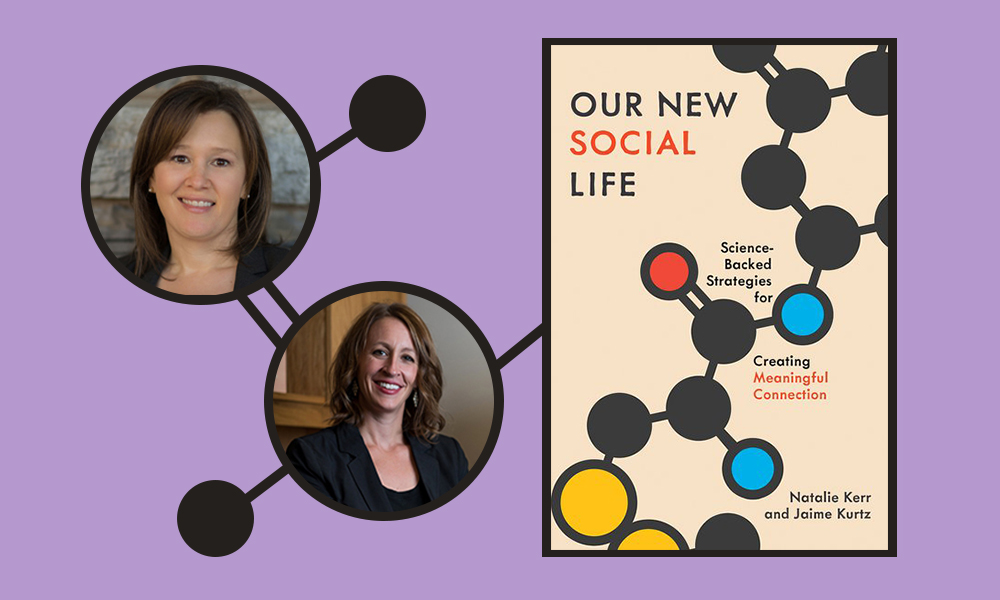Psychology faculty members’ new book gives tips on combating loneliness
College of Health and Behavioral Studies
Maintaining a meaningful social life can seem difficult, especially in our busy, modern lives. To address this, Psychology faculty Natalie Kerr and Jamie Kurtz published Our New Social Life: Science-Backed Strategies for Creating Meaningful Connection, which outlines both our need for social connection, as well as practical ways to create and foster deeper relationships in the context of an increasingly digital world.
“In 2017 the former US Surgeon General sounded an alarm about a growing epidemic of loneliness,” said Kerr. “Around that same time, two large meta-analyses identified loneliness as a significant risk factor for early mortality.”
“As social psychologists, we realized the gravity of the problem. But we also knew that the existing research offered helpful strategies for feeling more connected and less lonely,” said Kerr.
The two began their work to understand and combat loneliness through evidence-based practices with an online educational program called Build Your Village, designed to help JMU students feel less lonely by sharing strategies to help create new connections, strengthen existing relationships and overcome loneliness.
Their next step was to co-write Our New Social Life, which while based in science and evidence-based practices, remains approachable and applicable to average readers. “The book really is for anyone,” said Kerr. “Anyone who wants to feel more connected and less lonely or is simply interested in the science of connection.”
“Before we started writing, we recruited a team of undergraduates to help review the literature and distill it into practical tips,” said Kerr. “Our collaborative discussions sparked valuable ideas that contributed to the book’s development.”
“They also helped us understand the unique ways that their generation seeks out connection, including through dating apps and chatbots,” said Kerr.
Kurtz spoke to the importance and benefits of social connection. “There’s mounting evidence that feeling socially connected is critical for our well-being, both psychologically and physically,” she said.
“Relationships boost our mood and give us a chance to laugh, which has all kinds of downstream positive effects on your health. Relationships give us new and healthy perspective on our problems and provide us with coping mechanism and social support,” said Kurtz, citing some examples.
“Ultimately,” Kurtz said, “relationships remind us that we are not alone in the world. We are hardwired to connect with others. We’re most likely to thrive in life when this social need is met.”
One strategy discussed in the book regarding strategies to address loneliness is to reframe your perspective around social connection.
“The antidote to loneliness is not as simple as just reaching out to other people,” said Kerr. “Loneliness can distort your thinking about yourself and other people. We need to start by correcting those distortions.”
“Mindfulness meditation can actually be really helpful with this,” said Kerr. Although this is often done alone, “it can help you feel less lonely,” she said.
Another suggestion is to avoid overlooking opportunities for connection that are right in front of you. “For example,” said Kerr, “talking to strangers is something we often are reluctant to do, but we actually tend to enjoy that more than we think we will.”
“It gives us a happiness boost and helps us feel more connected. So, whether you’re talking to somebody at the bus stop or the barista at Starbucks, these little moments of connection can actually have a big effect,” said Kerr.
“Everybody is very busy these days,” said Kurtz. “But even so, we don’t want to save socializing for the weekend or holidays. It’s something to prioritize every day, even in small ways. Finding small moments of connection is really vital.”
Our New Social Life was published in January 2025 and is available for purchase through Oxford University Press books and other online retailers.
